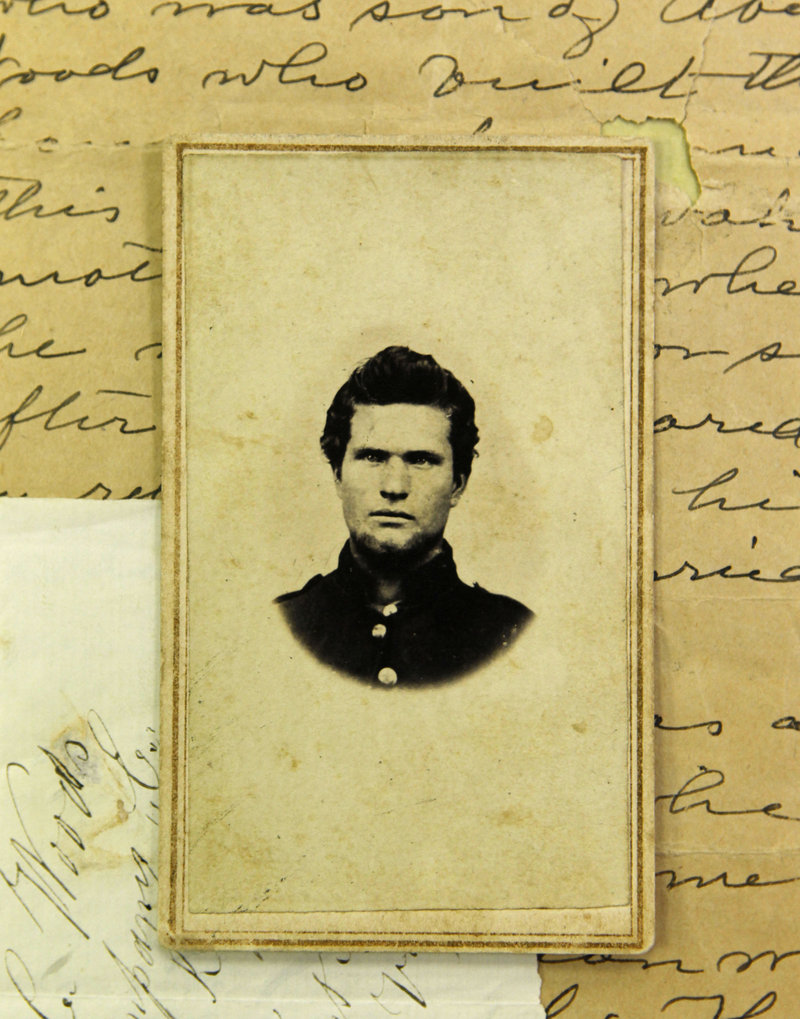ALBANY, N.Y. – Alfred Covell Woods faced down anti-Northern mobs in Baltimore, survived getting hit by a falling tree while sleeping and came away from some of the Civil War’s bloodiest battles unscathed, events he detailed in more than two dozen letters written to relatives back home in upstate New York.
The 21-year-old Southern-born sergeant’s luck ran out on May 5, 1864, when he was one of the 2,246 Union soldiers killed in the Battle of the Wilderness, fought in the dense forest underbrush in Spotsylvania County, Va. Woods’ remains are believed to have been buried on the battlefield, then later exhumed and re-interred at the national cemetery in Fredericksburg along with thousands of other Union “unknowns.”
This weekend, a granite tombstone bearing Woods’ name, rank, regiment and date of death will be unveiled in the cemetery plot next to his mother’s in his hometown of Crown Point, on Lake Champlain 90 miles north of Albany.
Civil War re-enactors from New York, Vermont and Canada, along with local veterans and a National Guard honor guard, will participate in Sunday morning’s memorial service, organizers said.
“He gave his life for his country,” said David Hirtle, pastor of First Congregational Church, next door to the cemetery. “To our knowledge he was never welcomed home. What we’re trying to do is right a wrong, albeit 150 years late.”
The idea for obtaining a veteran’s grave marker for Woods came about after Greg Furness, a retired state parks employee from nearby Mineville, learned that a collection of more than 30 of Woods’ wartime letters was sold piecemeal on eBay in 2007 by military antiques collectors.
Furness said Friday that by the time he tried to purchase the letters, the collection had been broken up and the letters, Woods’ two pocket diaries and a photograph of the soldier had been sold to several individuals, including a Civil War re-enactor in Australia. Furness later managed to purchase the diaries and photo, which he donated last year to the New York State Library in Albany.
“It was something I thought should be done. He was another forgotten guy who had his papers scattered all over the face of the Earth,” said Furness, whose great-grandfather was a Civil War veteran.
Woods was born down South, the son of a Crown Point native who married a Southern woman in Dallas County, Ala. Woods was still a boy when his father headed to Central America and never returned, and his mother died soon after relocating the family to Crown Point, where Alfred was raised by his aunt and uncle, Melissa and Reuben Smith.
After enlisting on May 1, 1861, with the 62nd New York State Volunteers, an infantry regiment also known as the Anderson Zouaves, Woods started writing letters home, many of them addressed to “My Dear Aunt.”
Over the next three years, the devout Christian soldier’s letters told of drunkenness and vulgarity among the ranks, marching through a mob of Southern sympathizers in Baltimore while en route to Washington and spending cold, wet nights sleeping outdoors within range of Confederate batteries in Virginia.
During one such night in January 1863, a tree that had been partly chopped by someone else fell onto Woods, causing serious injuries and putting him in the hospital for 12 days. He survived the carnage at Fredericksburg, Chancellorsville, Marye’s Heights and Gettysburg, and credited God with keeping him safe.
“Often, very often, my fellow soldiers have been shot by my side and torn in pieces and killed while I have been preserved,” he wrote in one of the letters, transcripts of which can be found online.
In another, dated six days after the Battle of Malvern Hill in Virginia on July 1, 1862, Woods wrote:
“Oh! I am sick of seeing so much Bloodshed and suffering which is enough to discourage the most hard veteran.”
In other letters, a battle-weary Woods professed his desire to return home and study for the ministry. On April 19, 1864, at Brandy Station, Va., he wrote his aunt that he was looking forward to the end of his three-year enlistment.
Sixteen days later, on May 5, Woods and the rest of the 62nd’s Co. E faced the Confederate onslaught on the first day of the three-day Battle of the Wilderness. In all, the regiment suffered 72 casualties, including 14 killed in action. Among them was Woods, whose enlistment was set to expire June 30.
Some time after Woods’ death, the Smiths passed his letters on to their daughter, who married into a prominent Crown Point family, Furness said. At some point, the letters left the family’s possession and eventually were sold to collectors, he said.
While reading the letters he found online, Furness said, he grew to admire Woods and others like him who fought in the Civil War. “I just got captured by his story,” Furness said. “He was just an interesting guy, and an interesting forgotten guy.”
Copy the Story Link
Send questions/comments to the editors.



Success. Please wait for the page to reload. If the page does not reload within 5 seconds, please refresh the page.
Enter your email and password to access comments.
Hi, to comment on stories you must . This profile is in addition to your subscription and website login.
Already have a commenting profile? .
Invalid username/password.
Please check your email to confirm and complete your registration.
Only subscribers are eligible to post comments. Please subscribe or login first for digital access. Here’s why.
Use the form below to reset your password. When you've submitted your account email, we will send an email with a reset code.